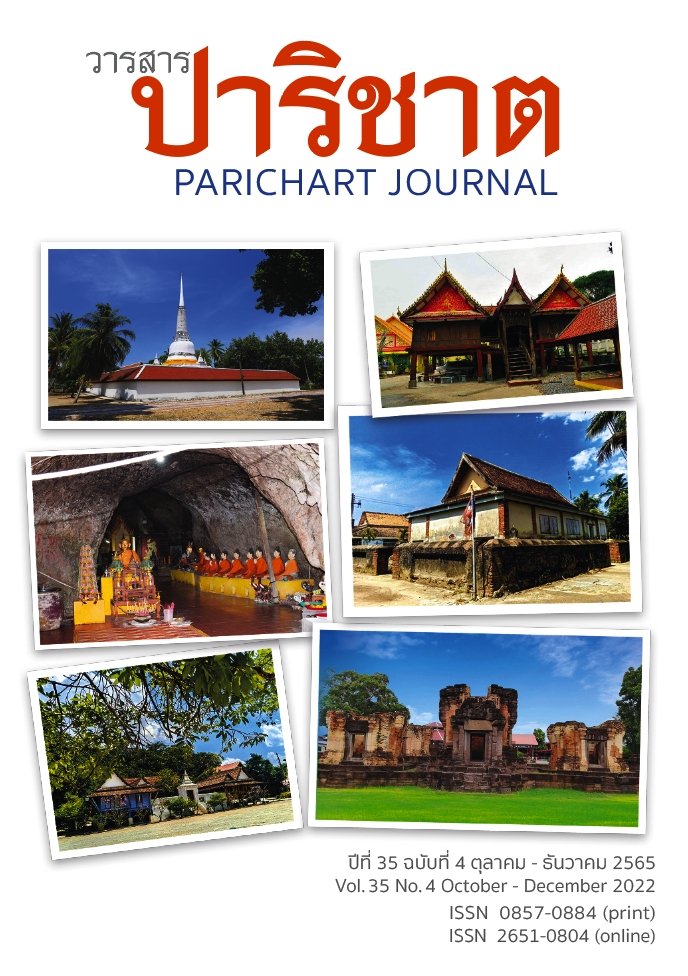A Needs Survey of Learning Chinese: Nursing Profession in Phuket Province
Main Article Content
Abstract
As a result of Chinese economic growth in the 21st century, Chinese for Specific Purposes (CPS) has become a new paradigm for the teaching and learning of language. Despite some differences, it is reasonable to adapt the English for Specific Purposes (ESP) framework, in which a Needs analysis is fundamental for course design, into the CPS process. This study has two aims: to survey the need for nurses in Phuket to learn the Chinese language, and to suggest a course design for the target learners. Data were collected from 100 nurses working in three public hospitals on Phuket Island. The research instrument was an online questionnaire. The data were analyzed using descriptive statistics. The results show a high demand for learning Chinese, especially listening and speaking skills for communicating with patients and their relatives. Writing and reading skills are not highly desired by the target learners. Therefore, it is recommended that hospitals in Phuket should arrange in-house Chinese language courses, with course design based on the learners’ needs and preferences reported in this study.
Article Details

This work is licensed under a Creative Commons Attribution-NonCommercial-NoDerivatives 4.0 International License.
References
Phuket Province, (2021). Phuket tourism sandbox. https://www.phuket.go.th/webpk/file_data/covid-19/province/4625-14-08-2564.pdf. (In Thai)
Manager Online. (2021). Phuket must survive. https://mgronline.com/south/detail/9640000039470. (In Thai)
Kanoksilpatham, B. (2012). Language for specific purposes in Asia. In C. Chapelle. (Ed.). The Encyclopedia of Applied Linguistics. (pp.1-7). Blackwell Publishing Ltd.
Airport of Thailand Public Company Limited. (2020). 2020 Airport traffic report. https://www.airportthai.co.th/wp-content/uploads/2021/07/Report-2020.pdf.
Rahman, M. (2015). English for specific purposes (ESP): A holistic review. Universal Journal of Educational Research, 3(1), 24-31.
Robinson, P. (1991). ESP today: A practitioner’s guide. Prentice Hall.
Hutchinson, T., & Waters, A. (1993). English for specific purposes. Cambridge University Press.
Dudley-Evans, T. & ST John, M.J. (1998). Developments in English for specific purposes. Cambridge University Press.
Woragittanont, I., & Suraratdecha, S. (2016). Needs analysis of studying English for medical students in a university with the aim of ASEAN Economic Community (AEC). Journal of Graduate Study in Humanities and Social Sciences, 5(1), 138-169.
Lodhi, M.A., Shamim, M., Robab, M., Shahzad, S.K., & Ashraf, A. (2018). English for doctors: An ESP approach to needs analysis and course design for medical students. International Journal of English Linguistics, 8(5), 205-214.
Kayaoglu, M. N., & Akbas, R.D. (2016). An investigation into medical students’ English language needs. Participatory Educational Research, Special Issue 2016(1), 63-71.
Finch, A. (2014). Caring in English: ESP for nurses. International Journal of English Language Teaching, 1(1), 1-10.
Lai, W. (2019). Needs analysis for a Chinese course for healthcare professionals. In Tao H., Chen H.J. (Eds). Chinese for Specific and Professional Purposes. (pp.267-286). Springer.
Kanoksilpatham, B. (2011). National survey of teaching Chinese as a foreign language in Thailand. [Paper Presentation] The 2nd Annual International Symposium of Foreign Language Learning. Jakarta.
Song, L., & Chalermnirundorn, N. (2019). Using role play in teaching Chinese speaking skills for a special purpose: A case study of a perfume company in Thailand. [Paper Presentation]. The 14th UTCC National Graduate Research Conference 2019. Bangkok.
Kaewbut, P. (2019). Needs assessment in Chinese skills development case study: Phuket International Airport Officials. Journal of International Studies, 9(2), 46-64.
Jeangjai, S., & Pathanasin, S. (2020). Chinese conversation lessons via web-based application: a pilot study of hotel front office staff. Journal of Language and Culture, 39(2), 102-121.


